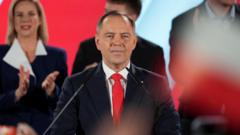The recent presidential runoff in Poland between Rafal Trzaskowski and Karol Nawrocki marked a significant moment in European politics as both candidates were nearly tied according to exit polls. The election's outcome is seen as indicative of the future of populist nationalism in Europe.
Poland's Presidential Election: A Tight Race Reflecting Europe's Political Divide

Poland's Presidential Election: A Tight Race Reflecting Europe's Political Divide
With exit polls showing a near tie, Poland's presidential election encapsulates the ongoing struggle between populism and liberalism within European politics.
A pivotal presidential election in Poland has concluded, with exit polls indicating a virtually neck-and-neck race as the official vote count begins. Rafal Trzaskowski, the liberal mayor of Warsaw, claimed a narrow lead, prompting him to declare a victory to his supporters. “Dear ladies and gentlemen — we won!” Trzaskowski announced, suggesting that the term ‘razor-thin victory’ would now become a part of Polish discourse.
According to the preliminary data from exit polling, Trzaskowski captured approximately 50.3 percent of the vote, while his opponent, nationalist historian Karol Nawrocki, supported by the previous governing party, Law and Justice, trailed closely with 49.7 percent. Nawrocki, addressing his own supporters, expressed confidence in his chances, forecasting an eventual victory once the official results are released.
Voter turnout reached 72.8 percent, the highest seen since 1990, the year Poland held its first direct presidential vote following the fall of communism. This election has been interpreted as a crucial indicator of the direction populist nationalism is heading in Europe, especially in light of recent political shifts in the region.
The candidacies emerged amidst polarizing views on Poland's political future. The campaign garnered attention from both supporters and critics of former U.S. President Donald Trump, with prominent right-wing figures in Europe backing Nawrocki. Conversely, Trzaskowski enjoyed support from mainstream political factions, including Prime Minister Donald Tusk’s centrist Civic Platform party.
The stakes of this election extend beyond individual preferences; they involve whether Polish voters desire a collaborative presidency that can work alongside Tusk's centrist government or one that opposes the establishment. The narrowness of the contest reflects a deeply divided electorate where right-wing nationalist movements face off against centrist candidates eager to reverse the past eight years of populist governance.
If Trzaskowski is officially declared the winner, it may lead to the end of a prolonged political stalemate that began when Law and Justice lost its parliamentary majority in 2023 yet retained the presidency, a largely ceremonial role that wields significant legislative veto power. A Nawrocki victory, conversely, would likely maintain the current deadlock and potentially entrench further divisions within Polish politics.
This election exemplifies not just a national decision but a broader struggle in Europe, as nations grapple with questions of identity, governance, and the nature of democracy amid resurgent nationalist movements.





















